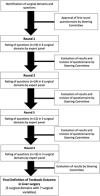An International Expert Delphi Consensus on Defining Textbook Outcome in Liver Surgery (TOLS)
- PMID: 35946822
- PMCID: PMC10082050
- DOI: 10.1097/SLA.0000000000005668
An International Expert Delphi Consensus on Defining Textbook Outcome in Liver Surgery (TOLS)
Abstract
Objective: To reach global expert consensus on the definition of TOLS in minimally invasive and open liver resection among renowned international expert liver surgeons using a modified Delphi method.
Background: Textbook outcome is a novel composite measure combining the most desirable postoperative outcomes into one single measure and representing the ideal postoperative course. Despite a recently developed international definition of Textbook Outcome in Liver Surgery (TOLS), a standardized and expert consensus-based definition is lacking.
Methods: This international, consensus-based, qualitative study used a Delphi process to achieve consensus on the definition of TOLS. The survey comprised 6 surgical domains with a total of 26 questions on individual surgical outcome variables. The process included 4 rounds of online questionnaires. Consensus was achieved when a threshold of at least 80% agreement was reached. The results from the Delphi rounds were used to establish an international definition of TOLS.
Results: In total, 44 expert liver surgeons from 22 countries and all 3 major international hepato-pancreato-biliary associations completed round 1. Forty-two (96%), 41 (98%), and 41 (98%) of the experts participated in round 2, 3, and 4, respectively. The TOLS definition derived from the consensus process included the absence of intraoperative grade ≥2 incidents, postoperative bile leakage grade B/C, postoperative liver failure grade B/C, 90-day major postoperative complications, 90-day readmission due to surgery-related major complications, 90-day/in-hospital mortality, and the presence of R0 resection margin.
Conclusions: This is the first study providing an international expert consensus-based definition of TOLS for minimally invasive and open liver resections by the use of a formal Delphi consensus approach. TOLS may be useful in assessing patient-level hospital performance and carrying out international comparisons between centers with different clinical practices to further improve patient outcomes.
Copyright © 2022 The Author(s). Published by Wolters Kluwer Health, Inc.
References
-
- Dijs-Elsinga J, Otten W, Versluijs MM, et al. . Choosing a hospital for surgery: the importance of information on quality of care. Med Decis Making. 2010;30:544–555. - PubMed
-
- Ciria R, Gomez-Luque I, Ocaña S, et al. . A systematic review and meta-analysis comparing the short- and long-term outcomes for laparoscopic and open liver resections for hepatocellular carcinoma: updated results from the European Guidelines Meeting on Laparoscopic Liver Surgery, Southampton, UK, 2017. Ann Surg Oncol. 2019;26:252–263. - PubMed
-
- Di Fabio F, Samim M, Di Gioia P, et al. . Laparoscopic major hepatectomies: clinical outcomes and classification. World J Surg. 2014;38:3169–3174. - PubMed
-
- Cipriani F, Rawashdeh M, Stanton L, et al. . Propensity score-based analysis of outcomes of laparoscopic versus open liver resection for colorectal metastases. Br J Surg. 2016;103:1504–1512. - PubMed
-
- Halls MC, Alseidi A, Berardi G, et al. . A comparison of the learning curves of laparoscopic liver surgeons in differing stages of the IDEAL paradigm of surgical innovation: standing on the shoulders of pioneers. Ann Surg. 2019;269:221–228. - PubMed
Publication types
MeSH terms
LinkOut - more resources
Full Text Sources
Medical


